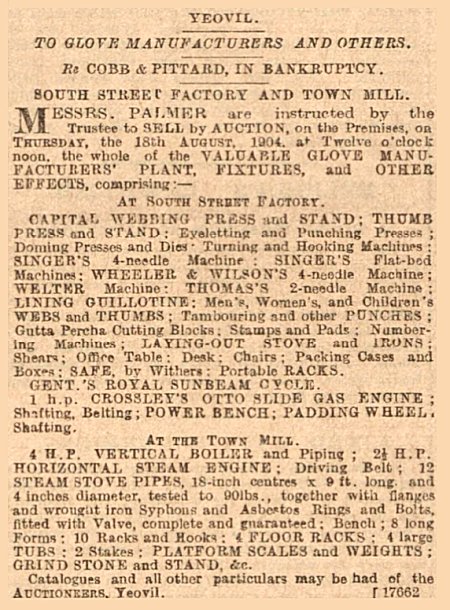Gloving in yeovil
Cobb & pittard
Glove Manufacturers
Cobb & Pittard was a short-lived glove manufacturing company formed around 1903 by Alexander Henry Cobb, the brother-in-law of glove manufacturer Edward Samuel 'Sam' Ewens, and Russell Pittard, the son of leather dressing magnate Ebenezer Pittard.
Cobb had previously been a commercial traveller in the book trade before going into partnership with his brother-in-law in 1898, forming the company Ewens & Cobb. Unfortunately the Ewens-Cobb partnership ended in a civil action in 1902 which Ewens lost, forcing him to sell his home 'Summerlands'.
Now that he had some capital after winning his case against Ewens and, presumably, now with some small amount of experience in the glove trade, it appears that Alexander next went into partnership with Russell Pittard, with Alexander being the senior partner of Cobb & Pittard.
Alas the partnership, and consequently the firm of Cobb & Pittard, lasted only until the following year when Cobb charged Pittard with theft and embezzlement. This time, however, due to Cobb's ineptitude in keeping the company accounts, the case was thrown out of court.
In its edition of 26 February 1904 the Western Gazette noted that "Alexander Henry Cobb and Russell George Pittard (carrying on business under the style or firm of Cobb & Pittard), Yeovil, glove manufacturers" were declared bankrupt.
Cobb v. PittardChronicle Office, Thursday 4 February 1904 The case in which the senior partner in Cobb & Pittard, glove manufacturers, Yeovil, charged the junior partner (Mr Russell Pittard) with theft and embezzlement, came to an abrupt conclusion on Friday. One charge was withdrawn by the Prosecutor, and the other was peremptorily dismissed by the magistrates. The Prosecutor based his charge of theft upon the evidence of the firm's account books, which were kept principally by himself. Although he had no professional assistance, he had more than once affirmed (under cross-examination) his belief that the books were correct. But they were so far from being correct that Mr Davies had no difficulty in making Prosecutor admit faults to such an extent that the books actually showed more mistakes than would account for the missing skins and money which the junior partner was accused of stealing. In short, Prosecutor admitted sufficient faults to justify an exact "tit-for-tat". The result of the hearing has caused great satisfaction in the town, where the Pittards are one of the best-known and most highly-respected families. The cross-examination of Mr Cobb by the defending solicitor put an altogether different complexion on the affair.
Cobb v. Pittard
Collapse
of the
Prosecution Chronicle Office, Friday 29 January 1904 This case came to a close on Friday afternoon, after the cross-examination of the prosecutor by Mr Davies. The whole of the morning had been occupied by the cross-examination, and about noon Mr Davies submitted a number of the firm's books, upon which the evidence of shortage had been based. Mr Cobb admitted a number of errors in these books. These errors related to miscalculations in the number of gloves cut and the whole represented 36 dozen skins which were not entered as being given out. Prosecutor had not noticed these errors when checking the amounts for the purpose of paying the wages. Mr Davies pointed out that this 36 dozen would turn the shortage which defendant was accused of stealing into a surplus. The Magistrates examined all the books referred to; and at this point an adjournment was made for lunch. On reassembling, Mr Marsh admitted that the statements which had been made and the result of Mr Trevor Davies' cross-examination of the prosecutor showed there had been a large number of skins issued to the workmen which were not entered as having been issued. Mr Davies said he was not astonished at Mr Marsh's position, and he was sure no-one was surprised the case had collapsed. He added that the cross-examination disclosed but a very small portion of the defence, and he now had no opportunity of showing the exact state of affairs in this firm's leather account. He had had a statement prepared by Messrs Denman & Allen, chartered accountants, proving beyond a shadow of a doubt that as far as stock and purchases were concerned the balance on the books proved that there was absolutely more skins and leather in the factory than there ought to be - that was, the books were so kept that they showed more skins were on the premises at the time of this charge than were required to account for what the firm had had. He (Mr Davies) had an absolute answer to what he did not hesitate to describe as a reckless, a stupid, and a most unwarrantable course of action on the part of the prosecutor. The charge was then, by leave, withdrawn. On the minor charge, that of embezzling £2 5s 0d, the Bench interposed in the cross-examination of Mr Cobb and dismissed the case. Prosecutor admitted that £35 had been drawn, but £2 10s of it had not been accounted for, and he also admitted that this book was kept by himself. Mr Davies asked him if he realised that this was a precisely similar charge to that which he was bringing against his partner; and at this point, as we have said, the Bench unanimously dismissed the case. There was loud cheering in the Court and among the crowd outside, and flags were hoisted by friends upon defendant's house.
Public NoticesChronicle, 1 February 1904 Mr Ebenezer Pittard and family have received so many letters, telegrams, and other communications congratulating them on the outcome of the hearing of "Cobb v. Pittard" that they find it impossible to acknowledge them individually. They beg, therefore, by this means to express their sincere thanks for all the kind messages.
|
Many thanks to
Ted Ewens for
supplying the
above newspaper
clippings.
GALLERY

The sale of Cobb & Pittard's equipment as advertised in the Western Gazette during several editions in July 1904.